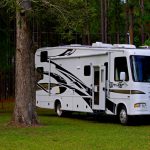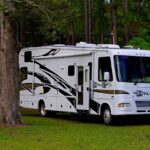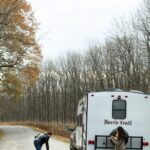
Have you ever found yourself daydreaming about trading in your four walls for a cozy RV, where every morning greets you with a brand-new view? 🌅 You’re not alone! With skyrocketing rent prices and the allure of the open road, many are asking: Is it really cheaper to live in an RV or an apartment?
In this article, we dive deep into the financial implications of both lifestyles, revealing surprising insights that might just inspire you to pack your bags and hit the road! 🚐💨 Did you know that full-time RV living can potentially save you thousands a year compared to traditional apartment living? But hold on—it’s not all sunshine and rainbows. Hidden costs and maintenance responsibilities can quickly pile up, turning your dream into a financial headache if you’re not careful.
Ready to uncover the truth? Buckle up as we explore 15 key insights that will help you make an informed decision about your living situation in 2024!
Key Takeaways 📝
- Cost Comparison: RV living can be cheaper than renting an apartment, but it depends on individual spending habits and lifestyle choices.
- Flexibility vs. Stability: RV living offers freedom to travel, while apartment living provides stability and predictability.
- Maintenance Responsibilities: RVs require hands-on maintenance, while landlords typically handle repairs in apartments.
- Community Connection: RV parks foster a strong sense of community among travelers, while apartment living requires more effort to build relationships.
- Environmental Impact: Both lifestyles have ecological footprints; conscious choices can help minimize your impact.
Interested in exploring RV options? Check out our recommended links for RV rentals and top RV brands for your next adventure! 🌍✨
Table of Contents
- Quick Tips and Facts: RV vs. Apartment Living
- The Financial Breakdown: Costs of RV Living vs. Apartment Living
- Lifestyle Comparison: Freedom of RV Living vs. Stability of Apartment Living
- Utilities and Maintenance: What You Need to Know
- Location, Location, Location: RV Parks vs. Apartment Complexes
- Insurance Insights: Protecting Your RV vs. Your Apartment
- Amenities and Comfort: What Each Lifestyle Offers
- Considering Full-Time RV Living? Here’s Why It Might Be Cheaper!
- Enjoy a Greater Slice of the Great Outdoors: Nature’s Playground Awaits
- The Hidden Costs of RV Living: What to Watch Out For
- The Social Aspect: Community in RV Parks vs. Apartment Living
- Sustainability: Eco-Friendliness of RV Living vs. Apartment Living
- What RV Brands Are Best for Full-Time Living?
- Conclusion
- Recommended Links
- FAQ
- Reference Links
Quick Tips and Facts: RV vs. Apartment Living #️⃣
🤔 Ever daydreamed about ditching the daily grind and hitting the open road? Or maybe you’re just tired of sky-high rent and noisy neighbors? The RV life might be calling! 🚐💨
But hold your horses! 🐴 Before you trade your apartment keys for a steering wheel, let’s weigh the pros and cons with some quick facts:
| Feature | RV Living | Apartment Living |
|---|---|---|
| Cost | Potentially lower, but with variable expenses | Generally higher, but more predictable |
| Flexibility | Ultimate freedom to travel and relocate | Limited by lease agreements |
| Space | Limited living area, requires downsizing | More spacious, but varies greatly |
| Maintenance | You’re responsible for everything! | Landlord typically handles most repairs |
| Amenities | Varies greatly, some parks offer resort-style | Usually includes basics like laundry and parking |
| Community | Strong among RVers, always meeting new people | Can be hit or miss, depends on the building |
Think of it like this: An RV is like owning a pet – incredibly rewarding, but requires commitment and comes with surprises (not always the good kind! 💩). An apartment is more like a goldfish – less demanding, but also less exciting. 🐠
Ready to dive deeper? Let’s explore the nitty-gritty of RV vs. Apartment living! 👇
The Financial Breakdown: Costs of RV Living vs. Apartment Living 💰
Let’s face it, the almighty dollar often dictates our choices. So, is RV living really cheaper than renting an apartment? The answer, like a winding mountain road, has twists and turns! 🏔️
Initial Investment
- RV Purchase: This is your biggest upfront cost. A brand new Class A motorhome can set you back more than a small apartment, while a used Class B campervan might be comparable to a few months’ rent. What’s the Real Difference Between a Class A Motorhome and an RV? 10 Essential Insights for 2024!
- Apartment Security Deposit & First/Last Month’s Rent: This chunk of change can rival a down payment on an RV.
Recurring Costs
-
RV Life:
- Campground Fees: These vary wildly! Boondocking (free camping) can save you money, while luxury RV resorts can cost more than a hotel.
- Fuel Costs: Gas prices fluctuate, and a gas-guzzling RV can drain your budget faster than you can say “road trip!” ⛽
- Maintenance & Repairs: RVs, like any vehicle, require upkeep. Unexpected breakdowns can lead to hefty repair bills. 🛠️
- Insurance: You’ll need specialized RV insurance, which can be pricier than auto insurance.
-
Apartment Life:
- Rent: This fixed monthly expense is usually your biggest cost.
- Utilities: Expect to pay for electricity, gas, water, trash, and sometimes internet and cable.
- Renter’s Insurance: Protects your belongings in case of damage or theft.
Hidden Costs
-
RV Living:
- Propane: Used for heating, cooking, and hot water in many RVs.
- Dumping Fees: Gotta get rid of that waste somehow! 🤢
- Activities & Entertainment: You’re on the road to explore, right? Those national park entrance fees and local attractions can add up.
-
Apartment Living:
- Parking: Can be an additional monthly expense, especially in cities.
- Pet Fees: Furry friends often come with extra costs. 🐶🐱
- Amenity Fees: Some apartment complexes charge for access to gyms, pools, or laundry facilities.
Bottom Line: Determining which lifestyle is cheaper depends on your individual spending habits, travel style, and choice of RV.
Lifestyle Comparison: Freedom of RV Living vs. Stability of Apartment Living ⚖️
Choosing between RV and apartment living is like choosing between a free-spirited nomad and a homebody with a green thumb. Both have their charms! ✨
RV Living: Embrace the Open Road 🏞️
-
Pros:
- Unmatched Freedom: Wake up to a mountain sunrise one day, ocean waves the next! 🌅🌊 The open road is your oyster. 🦪
- Ever-Changing Scenery: Say goodbye to boring commutes and hello to breathtaking vistas!
- Strong Sense of Community: RVers are a friendly bunch, always willing to share tips, stories, and maybe even a campfire. 🔥
- Minimalism & Simplicity: Downsizing to an RV forces you to prioritize what truly matters.
- Pet-Friendly Options: Many RV parks welcome furry companions, so Fido can join the adventure! 🐾
-
Cons:
- Lack of Stability: Always on the move can be tiring and sometimes lonely.
- Limited Space: Tiny living isn’t for everyone! Get ready to get cozy.
- Weather Dependent: Mother Nature can be unpredictable, and extreme weather can put a damper on your plans. ⛈️
- Finding Reliable Internet & Cell Service: Can be challenging in remote areas.
Apartment Living: Enjoy the Comforts of Home 🏡
-
Pros:
- Stability & Routine: Having a permanent address provides a sense of security and normalcy.
- More Space & Amenities: Enjoy separate rooms, in-unit laundry, and often amenities like gyms and pools.
- Privacy: Escape the close quarters of RV living and enjoy some solitude.
- Easier to Maintain Relationships: Staying in one place makes it easier to nurture friendships and family connections.
-
Cons:
- Lack of Flexibility: Tied to a lease and limited by location.
- Can Be Expensive: Rent, utilities, and parking costs can eat up a big chunk of your income.
- Noise & Neighbors: Apartment living often means dealing with thin walls and noisy neighbors.
The Verdict: The best choice depends on your personality, priorities, and lifestyle preferences. Are you a free spirit craving adventure? Or do you value stability and routine?
Utilities and Maintenance: What You Need to Know 🔌🔧
Whether you’re hooked up at an RV park or settled in an apartment, both lifestyles come with their own set of utility bills and maintenance responsibilities. Let’s break it down:
RV Living: Be Your Own Handyman (or Woman!) 🧰
- Water: You’ll need to find a source to fill your freshwater tank and a place to dump your gray and black water tanks.
- Tip: Invest in a water pressure regulator to protect your RV’s plumbing.
- Electricity: Hooking up to shore power at an RV park is the easiest option, but you can also use a generator or solar panels for off-grid adventures.
- Caution: Generators can be noisy and require fuel, while solar panels require an initial investment.
- Propane: Used for heating, cooking, and hot water in many RVs. You’ll need to refill propane tanks periodically.
- Maintenance: RVs require regular maintenance, just like any vehicle. Be prepared to tackle tasks like:
- Winterizing: Protecting your RV’s plumbing from freezing temperatures.
- Checking Tire Pressure: Important for safety and fuel efficiency.
- Cleaning Black and Gray Water Tanks: Not the most glamorous task, but essential! 🤢
- General Repairs: Things break, it’s inevitable! Be prepared to troubleshoot or hire a professional.
Apartment Living: Landlord to the Rescue (Hopefully!) 🙏
- Utilities: Typically, you’ll pay for electricity, gas, water, trash, and sometimes internet and cable. Some apartments include utilities in the rent.
- Maintenance: One of the perks of apartment living is that your landlord is usually responsible for major repairs. However:
- Response times can vary: You might be stuck waiting for a leaky faucet to be fixed.
- You’re responsible for renter’s insurance: To protect your belongings in case of damage or theft.
The Takeaway: RV living requires more hands-on maintenance and resourcefulness, while apartment living offers more convenience but less control.
Location, Location, Location: RV Parks vs. Apartment Complexes 📍
Choosing where to park your RV or rent an apartment is like choosing between a bustling city center and a tranquil forest retreat. Both offer unique advantages and disadvantages! 🏙️🌲
RV Parks: Your Home Away from Home (Temporarily!) 🏕️
-
Types of RV Parks:
- Luxury Resorts: Offer amenities like swimming pools, hot tubs, clubhouses, and planned activities. Expect to pay a premium for these perks!
- State Parks & National Parks: Often located in scenic areas with access to hiking trails, lakes, and other outdoor activities. Reservations are highly recommended, especially during peak season.
- Privately Owned Campgrounds: Range from basic to full-service, with varying amenities and price points.
- Boondocking: Free camping on public lands, offering solitude and adventure but limited or no amenities.
-
Pros:
- Flexibility to Move: Don’t like your neighbors? No problem, just hitch up and find a new spot!
- Outdoor Living: Enjoy campfires, picnics, and stargazing right outside your door. ✨
- Sense of Community: RV parks often foster a friendly atmosphere where neighbors gather for potlucks and social events.
-
Cons:
- Finding Availability: Popular parks can book up months in advance, especially during peak season.
- Varying Amenities: Not all RV parks offer full hookups (water, sewer, electricity), so do your research!
- Noise Levels: Can vary depending on the park and your neighbors.
Apartment Complexes: Finding Your Place in the Concrete Jungle 🏢
-
Types of Apartments:
- High-Rise Buildings: Offer city views and often amenities like rooftop decks and fitness centers. Expect to pay a premium for these perks!
- Garden-Style Apartments: Low-rise buildings with more green space and a quieter atmosphere.
- Walk-Up Apartments: Smaller buildings with no elevator, often more affordable but less convenient.
-
Pros:
- Stability & Convenience: Enjoy a permanent address and easy access to city amenities.
- More Space & Privacy: Spread out and enjoy some solitude.
- Predictable Costs: Rent and utilities are usually fixed, making budgeting easier.
-
Cons:
- Limited Flexibility: Tied to a lease agreement.
- Noise & Neighbors: Thin walls and close quarters can lead to noise complaints and neighborly disputes.
- Lack of Outdoor Space: Many apartments have limited or no private outdoor space.
The Bottom Line: Choosing the right location depends on your lifestyle, budget, and tolerance for noise and crowds.
Insurance Insights: Protecting Your RV vs. Your Apartment 📑
Just like your trusty first-aid kit, insurance is essential for both RV and apartment living, providing peace of mind in case of unexpected mishaps. But what type of coverage do you really need? 🤔
RV Insurance: Hitting the Road with Protection 🚐
-
Specialized Coverage: RV insurance is different from standard auto insurance, offering coverage tailored to the unique risks of RV travel.
-
Key Coverage Options:
- Liability Coverage: Protects you if you cause damage to someone else’s property or injure someone while driving your RV.
- Collision Coverage: Covers damage to your RV if you’re in an accident.
- Comprehensive Coverage: Covers damage to your RV from non-collision events like theft, vandalism, or natural disasters.
- Personal Belongings Coverage: Protects your belongings inside the RV, like electronics, clothing, and camping gear.
- Roadside Assistance: A lifesaver in case of breakdowns or flat tires.
-
Factors Affecting Cost:
- Type & Value of RV: Class A motorhomes generally cost more to insure than smaller campervans.
- Driving History: A clean driving record can lower your premiums.
- Coverage Limits & Deductibles: Higher coverage limits and lower deductibles mean higher premiums.
Apartment Insurance: Protecting Your Stuff (and Yourself!) 🏢
-
Renter’s Insurance: Protects your personal belongings from covered perils like theft, fire, vandalism, and certain types of water damage.
-
Key Coverage Options:
- Personal Property Coverage: Covers your belongings up to your policy limits.
- Liability Coverage: Protects you if someone is injured in your apartment or if you accidentally damage someone else’s property.
- Additional Living Expenses Coverage: Helps cover the cost of temporary housing if your apartment becomes uninhabitable due to a covered peril.
-
Factors Affecting Cost:
- Location: Apartments in high-crime areas may have higher premiums.
- Coverage Limits & Deductibles: Higher coverage limits and lower deductibles mean higher premiums.
The Takeaway: Both RV and apartment insurance are essential for protecting your belongings and finances. Shop around for quotes from different insurance providers to find the best coverage at the best price.
Amenities and Comfort: What Each Lifestyle Offers 🛁🧺
Let’s be real, sometimes it’s the little luxuries that make all the difference! From cozy beds to hot showers, both RV and apartment living offer varying levels of comfort and convenience.
RV Living: Embracing the Great Outdoors (and Sometimes Roughing It!) 🏕️
- Sleeping Arrangements: RVs come with various sleeping options, from convertible dinettes to bunk beds to king-size master suites in luxury models.
- Tip: Invest in a comfortable mattress topper for a good night’s sleep!
- Cooking Facilities: Most RVs have kitchens equipped with a stovetop, oven, microwave, and refrigerator. Some even have outdoor kitchens! 🍳
- Bathroom & Shower: Having a private bathroom and shower is a game-changer in an RV. However, space is limited, and water conservation is key.
- Entertainment & Technology: Many RVs come equipped with TVs, DVD players, and sound systems. You can even get satellite internet for staying connected on the road.
- Outdoor Living Space: One of the best parts of RV living is enjoying the great outdoors right outside your door. Many RVs have awnings, outdoor kitchens, and even outdoor entertainment systems.
Apartment Living: Enjoying the Comforts of Home (and Sometimes Dealing with Noisy Neighbors!) 🏢
- Sleeping Arrangements: Enjoy the luxury of a separate bedroom (or bedrooms!) with ample space for a comfortable bed and furniture.
- Cooking Facilities: Apartment kitchens vary in size and amenities, but most have a stovetop, oven, refrigerator, and sink.
- Bathroom & Shower: Enjoy spacious bathrooms with hot showers and often a bathtub.
- Entertainment & Technology: Most apartments have cable TV and internet hookups. Some even have built-in sound systems and smart home features.
- Outdoor Living Space: Access to outdoor space varies greatly in apartments. Some have balconies or patios, while others have shared courtyards or rooftop decks.
The Verdict: RV living offers a unique blend of outdoor adventure and indoor comfort, while apartment living provides more traditional amenities and space.
Considering Full-Time RV Living? Here’s Why It Might Be Cheaper! 🚐💰
Ready to trade your cramped apartment for a home on wheels? Full-time RV living can be an incredible way to explore the open road, downsize your life, and potentially save money! Here’s why:
- No More Rent or Mortgage Payments: Say goodbye to those hefty monthly housing costs! Instead, you’ll pay for campground fees, which can be significantly cheaper, especially if you’re willing to boondock (camp for free on public lands).
- Lower Utility Bills: While you’ll still have costs associated with water, electricity, and propane, these are often much lower than traditional utility bills.
- Minimalist Living: Downsizing to an RV forces you to get rid of unnecessary possessions and embrace a simpler lifestyle. Less stuff means less spending!
- Tax Advantages: Depending on your situation, you may be eligible for tax deductions or credits related to your RV.
- Cooking at Home: Eating out less and cooking more meals in your RV kitchen can save you a bundle.
But wait, there’s more! Full-time RV living isn’t just about saving money, it’s about:
- Experiencing the Freedom of the Open Road: Wake up to a new view every day! 🌅
- Connecting with Nature: Spend your days hiking, biking, fishing, and exploring the great outdoors. 🏞️
- Meeting Like-Minded People: The RV community is incredibly welcoming and supportive.
- Creating Unforgettable Memories: From epic road trips to quiet evenings under the stars, RV living is all about embracing adventure. ✨
Ready to take the leap? Check out our Full-Time RVing category for tips, advice, and inspiration!
Enjoy a Greater Slice of the Great Outdoors: Nature’s Playground Awaits 🏞️
One of the most alluring aspects of RV living is the unparalleled access to nature’s playground. Imagine waking up to the sound of birdsong, breathing in fresh mountain air, and spending your days exploring breathtaking landscapes.
- National Parks: From the towering redwoods of Yosemite to the geothermal wonders of Yellowstone, America’s national parks offer a lifetime’s worth of adventure.
- State Parks: Often less crowded than national parks, state parks offer a diverse range of landscapes, from beaches and forests to deserts and mountains.
- Hiking Trails: Lace up your boots and hit the trails! RV living makes it easy to access some of the most scenic hiking trails in the country.
- Water Activities: Whether you prefer kayaking, canoeing, fishing, or simply relaxing by the lake, RV living puts you close to the water.
- Wildlife Viewing: Keep your eyes peeled for wildlife! From majestic elk and bears to playful otters and dolphins, you never know what you might see.
Tips for Enjoying the Outdoors:
- Plan Ahead: Research your destination, make reservations if needed, and pack appropriate gear.
- Leave No Trace: Respect the environment and pack out everything you pack in.
- Be Aware of Wildlife: Observe animals from a safe distance and store food securely.
- Stay Hydrated: Drink plenty of water, especially when hiking or engaging in strenuous activities.
- Protect Yourself from the Sun: Wear sunscreen, a hat, and sunglasses, even on cloudy days.
Embrace the Adventure: RV living opens up a world of possibilities for outdoor enthusiasts. Get out there and explore!
The Hidden Costs of RV Living: What to Watch Out For ⚠️
While RV living can be an incredibly rewarding and potentially cheaper alternative to traditional housing, it’s important to be aware of the hidden costs that can sneak up on you.
- Unexpected Repairs: RVs, like any vehicle, require regular maintenance and are prone to breakdowns. Be prepared for unexpected repair costs, which can range from minor fixes to major engine overhauls.
- Tip: Invest in a good roadside assistance plan for peace of mind.
- Fluctuating Fuel Costs: Gas prices can be unpredictable, and a gas-guzzling RV can put a dent in your budget, especially if you’re doing a lot of driving.
- Tip: Plan your routes carefully, drive efficiently, and consider using gas apps to find the cheapest fuel prices.
- Campground Fees: While campground fees are often cheaper than rent or mortgage payments, they can add up, especially if you’re staying at luxury RV resorts or in high-demand areas.
- Tip: Consider boondocking (camping for free on public lands) to save money.
- Propane Costs: Propane is used for heating, cooking, and hot water in many RVs. The cost of propane can fluctuate, and you’ll need to refill your tanks periodically.
- Tip: Use propane sparingly and insulate your RV well to conserve energy.
- Hidden Fees: Some campgrounds charge extra for amenities like Wi-Fi, cable TV, and use of laundry facilities.
- Tip: Read the fine print before booking a campground to avoid surprises.
Don’t Let Hidden Costs Derail Your Dreams: By being aware of potential expenses and budgeting carefully, you can mitigate the financial risks and enjoy the many rewards of RV living.
The Social Aspect: Community in RV Parks vs. Apartment Living 🏕️🏢
Whether you’re a social butterfly or a solitary soul, both RV and apartment living offer unique opportunities for connection and community.
RV Parks: Finding Your Tribe on the Road 🚐
- A Welcoming Community: RVers are generally a friendly and welcoming bunch, always willing to lend a helping hand, share travel tips, and swap stories around the campfire.
- Planned Activities & Social Events: Many RV parks organize potlucks, game nights, dances, and other social events, providing ample opportunities to mingle with fellow travelers.
- Shared Interests: RVing attracts people from all walks of life, but you’re likely to find common ground with others who share your love of travel, adventure, and the great outdoors.
- Making Lifelong Friends: It’s not uncommon for RVers to form close bonds with their travel companions and campground neighbors, creating lifelong friendships that span the miles.
Apartment Living: Navigating the Urban Jungle (and Sometimes Finding Hidden Gems!) 🏙️
- Building a Sense of Community: While apartment living can sometimes feel isolating, there are ways to foster a sense of community:
- Attend building events: Many apartment complexes organize resident appreciation events, holiday parties, and other social gatherings.
- Get to know your neighbors: A simple hello in the hallway or a friendly chat by the mailboxes can go a long way.
- Join building clubs or groups: Some apartment complexes have book clubs, fitness groups, or other resident-led activities.
- Connecting with Your City: Apartment living often provides easy access to city amenities and social events, from museums and art galleries to concerts and festivals.
The Takeaway: Both RV and apartment living offer opportunities for social connection, but the nature of those connections differs. RV parks foster a transient but tight-knit community, while apartment living requires more effort to build relationships but offers a wider range of social outlets.
Sustainability: Eco-Friendliness of RV Living vs. Apartment Living 🌿
In an era of increasing environmental awareness, it’s natural to wonder about the ecological footprint of our lifestyle choices. So, how do RV living and apartment living stack up in terms of sustainability?
RV Living: Minimizing Your Impact on the Road 🚐
- Fuel Consumption: RVs, especially larger models, consume a significant amount of fuel, contributing to greenhouse gas emissions.
- Tip: Choose a fuel-efficient RV, drive efficiently, and consider using gas apps to find the cheapest fuel prices.
- Water Usage: RVs have limited water storage capacity, requiring frequent refills and dumps.
- Tip: Conserve water by taking shorter showers, using water-saving appliances, and catching gray water for watering plants.
- Waste Disposal: Properly disposing of gray and black water is crucial to protecting the environment.
- Tip: Use designated dump stations and avoid dumping chemicals or waste into the environment.
- Off-Grid Living: Solar panels, composting toilets, and other eco-friendly upgrades can reduce your environmental impact.
Apartment Living: Making Sustainable Choices in a Shared Space 🏢
- Energy Consumption: Apartments generally use less energy per square foot than single-family homes, but energy consumption can vary greatly depending on the building’s efficiency and your personal habits.
- Tip: Choose an energy-efficient apartment, use energy-saving appliances, and turn off lights and electronics when not in use.
- Water Usage: Water consumption in apartments can be high, especially in older buildings with inefficient fixtures.
- Tip: Take shorter showers, fix leaky faucets, and consider using low-flow showerheads and toilets.
- Waste Reduction: Recycling and composting programs are becoming increasingly common in apartment complexes.
- Tip: Recycle properly, compost food scraps if possible, and reduce your overall waste by choosing reusable products.
The Takeaway: Both RV and apartment living have environmental impacts. By making conscious choices to reduce your consumption, conserve resources, and dispose of waste responsibly, you can minimize your ecological footprint, regardless of your chosen lifestyle.
What RV Brands Are Best for Full-Time Living? 🏆
Choosing the right RV for full-time living is like choosing a life partner – it’s a big decision! You need a reliable companion that fits your lifestyle, budget, and wanderlust. Here are some top contenders:
Class A Motorhomes: The Rolling Palaces 👑
- Best For: Those seeking spacious luxury and all the comforts of home on wheels.
- Top Brands:
- Tiffin Motorhomes: Known for their luxurious interiors, quality craftsmanship, and smooth ride.
- Newmar Corporation: Offers a wide range of models with innovative features and a reputation for durability.
- Entegra Coach: Combines luxury amenities with a focus on technology and driver comfort.
Class B Motorhomes: The Nimble Navigators 🚐
- Best For: Couples or solo travelers who prioritize maneuverability and fuel efficiency.
- Top Brands:
- Airstream: Iconic silver bullet design with a cult following, known for their quality and resale value.
- Winnebago: Offers a variety of Class B models, from compact campervans to larger RVs with slide-outs.
- Roadtrek: Focuses on functionality and innovation, with features like solar panels and advanced electrical systems.
Class C Motorhomes: The Versatile Voyagers 🚐
- Best For: Families or groups who need more space than a Class B but still want ease of driving.
- Top Brands:
- Jayco: Offers a wide range of affordable Class C models with family-friendly features.
- Coachmen RV: Known for their quality construction, innovative floor plans, and value for money.
- Thor Motor Coach: One of the largest RV manufacturers, offering a diverse lineup of Class C motorhomes.
Travel Trailers: The Home-Away-From-Home Heroes 🏡
- Best For: Those who want the flexibility to unhitch and explore without their living space.
- Top Brands:
- Grand Design RV: Focuses on quality construction, innovative features, and customer satisfaction.
- Keystone RV: Offers a wide range of travel trailer models, from lightweight options to luxurious fifth wheels.
- Forest River RV: One of the largest RV manufacturers, with a diverse lineup of travel trailers to fit every budget and lifestyle.
Remember: The best RV brand for you depends on your individual needs and preferences. Do your research, read reviews, and visit dealerships to find the perfect match!
Conclusion 🎉

So, is it cheaper to live in an RV or an apartment? The answer is a bit like a well-cooked s’more—sweet, gooey, and layered with complexities! 😅
Positives of RV Living:
- Flexibility: Travel wherever the wind takes you, with the freedom to change your scenery anytime.
- Potential Cost Savings: With careful budgeting, RV living can be cheaper than traditional housing, especially if you embrace boondocking and minimize campground fees.
- Community: Connect with fellow travelers and build lasting friendships on the road.
- Closer to Nature: Wake up surrounded by stunning landscapes and enjoy outdoor adventures at your doorstep.
Negatives of RV Living:
- Maintenance Responsibilities: You’re the handyman now! Regular upkeep and repairs can be time-consuming and costly.
- Limited Space: Tiny living can feel cramped, especially for families or those who love their space.
- Hidden Costs: Fuel, campground fees, and unexpected repairs can add up quickly, so budgeting is crucial.
- Weather Vulnerabilities: RVs are less insulated than traditional homes, making them susceptible to extreme weather conditions.
In conclusion, if you crave adventure, flexibility, and the beauty of nature, RV living might just be your ticket to freedom! However, if stability, space, and convenience are more your style, sticking with an apartment could be the way to go. Either way, the choice is yours, and there are pros and cons to both lifestyles.
Finally, remember: Life is about experiences, so choose the one that aligns with your values and dreams! 🌈
Recommended Links 🛒
- 👉 Shop RVs on: RVShare | Outdoorsy | Camping World
- Books on RV Living:
FAQ ❓
Is it financially smart to live in an RV?
🤔 Yes, but it depends on your lifestyle and financial habits.
Living in an RV can be financially smart if you carefully budget for all associated costs, including maintenance, fuel, and campground fees. Many RVers find it a cost-effective alternative to traditional housing, especially if they embrace a minimalist lifestyle and prioritize experiences over possessions.
Read more about “Is it financially smart to live in an RV?”
Is it more expensive to live in an RV or an apartment?
💸 It varies based on location and lifestyle choices.
While RV living can be cheaper, especially in terms of not paying rent or a mortgage, hidden costs like fuel, maintenance, and campground fees can add up. Apartments usually have fixed costs, making budgeting easier. Ultimately, your financial situation and lifestyle preferences will determine which option is more economical for you.
Read more about “Is It Cheaper to Live in an RV Than a House? 10 Surprising Insights … 🚐💰”
Is an RV the cheapest way to live?
🏕️ Not necessarily, but it can be!
While RV living can be cheaper than traditional housing, it requires careful planning and budgeting. Factors like the cost of the RV, maintenance, insurance, fuel, and campground fees can impact overall expenses. If managed well, RV living can be a cost-effective way to enjoy life on the road.
What is the downside of living in an RV full-time?
😟 There are a few challenges to consider.
Full-time RV living can lead to feelings of isolation, limited space, and the need for constant maintenance. Additionally, weather can be a factor, as RVs are not as well-insulated as traditional homes. Lastly, finding reliable internet and cell service can be challenging in remote areas.
Read more about “What Percentage of RVers Are Full-Time? Discover the Surprising Truth! … 🚐”
What are the best RV brands for full-time living?
🏆 Some top brands include Tiffin Motorhomes, Airstream, and Grand Design RV.
These brands are known for their quality construction, innovative features, and customer satisfaction. Choosing the right RV brand depends on your individual needs and preferences.
Can you live in an RV year-round?
🌦️ Yes, but it requires careful planning.
Many people successfully live in RVs year-round, but it involves considerations such as winterizing your RV, ensuring adequate heating, and finding suitable campgrounds or RV parks that remain open during the winter months.
Read more about “… How do I start an RV lifestyle? A Comprehensive Guide”





